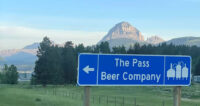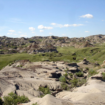Groups opposed to new mining
By Jensen, Randy on July 13, 2020.
Tim Kalinowski
Lethbridge Herald
tkalinowski@lethbridgeherald.com
While the coal industry representatives say the benefits of new potential mines in southwestern Alberta will pay huge dividends for local communities and help buoy Alberta’s flailing economy, several local conservation groups are opposed to the creation of new mines which, they say, will impact sensitive eco-systems.
“We want to make sure our public lands are well managed,” says Katie Morrison, conservation director with the Canadian Parks and Wilderness Society (CPAWS) in southern Alberta, “whether that means having protected areas or well-managed protected areas as well as making sure that areas that are not protected which have heightened ecological value also have good management to ensure we are protecting those values.
“With the removal of the (Alberta) coal policy (by Alberta’s UCP government), we have seen a whole area being opened up to coal exploration, and we have seen a lot of companies since that change, or slightly before that change, moving in for coal exploration – so building roads, opening drill-pits and potentially in the future building coal mines in that area.”
Morrison explains her group and its conservation partners are particularly concerned about any potential coal mining in the Livingstone Range. They feel the highest value of the land is keeping it in its natural state for tourism, recreation and ranching, and to ensure the protection of headwaters for the entire region.
“By removing that coal policy, it really opens up a huge area of highly sensitive places that could now be turned into open-pit coal mines,” she says.
“It’s all to do with the where. We are not anti-development. We live in a province that relies on natural resources, but we really need to be looking at where we do those things.
“I think anyone who uses that (Livingstone) area, whether for recreation use, for hiking or motorized recreation, everyone should be concerned about seeing that landscape drastically changed into an industrial coal landscape,” Morrison states.
A Livingstone landowners group will be appearing before city council today to seek support for their opposition to mining.
Coal Association of Canada president Robin Campbell says the use of the term “open pit” is really a red herring in this entire conversation.
“We are a very heavily regulated industry,” he says. “We follow the rules, and make sure we do a good job of reclamation. We take pride in the fact we do extract the resource, but we also can return the area to a viable area after we are done.
“So, yes, we mine open pits and we fill them back in. Or we do whatever the government asks. Up in Hinton, the government asked us to do end-of-pit lakes. So after the pit was done, we turned them into lakes. That is what the government of the day asked us to do.”
Campbell feels there is overwhelming support for new coal mines in local communities in the Crowsnest Pass and beyond.
“The coal industry brings good-paying jobs,” he states. “It brings tax revenue for municipalities and the province. It helps promote areas right now that are in economic hardship. All these mines are in rural communities. We don’t mine coal in downtown Edmonton or Calgary, or for that matter, in downtown Lethbridge. But we do mine in rural communities, and provide good-paying jobs that help the infrastructure of these communities.”
He explains the difference between the type of metallurgic, or “steel-making,” coal which would be mined in these new mines versus other places where thermal coal is burned to make power. The main feature of which, he says, is this type of coal is produced for export overseas instead for domestic firing.
“People talk about greenhouse gases and they mention thermal coal,” Campbell says. “They really don’t understand steel-making coal. There are two types of coal. There is thermal coal for power, and then there is steel-making coal. What we are looking at developing down in the Crowsnest Pass area is all steel-making coal. So that is all coal for export which will go to Japan, China, Korea, anywhere there are steel mills around the world.”
He says the Alberta product, in particular, is highly valued for its purer qualities when burned.
“We are lucky in Canada because all of our coal is low sulphur, low phosphate -it has really good properties for steel making and that is why it is in such demand. We’re lucky there is investment coming from other countries, especially Australia, that wants to reignite the industry, so to speak. With the issues with oil and gas, the Alberta government realizes metallurgic coal, while it will never replace oil and gas as far as revenue, it can definitely help a lot of our smaller communities.”
Follow @TimKalHerald on Twitter
23-22




